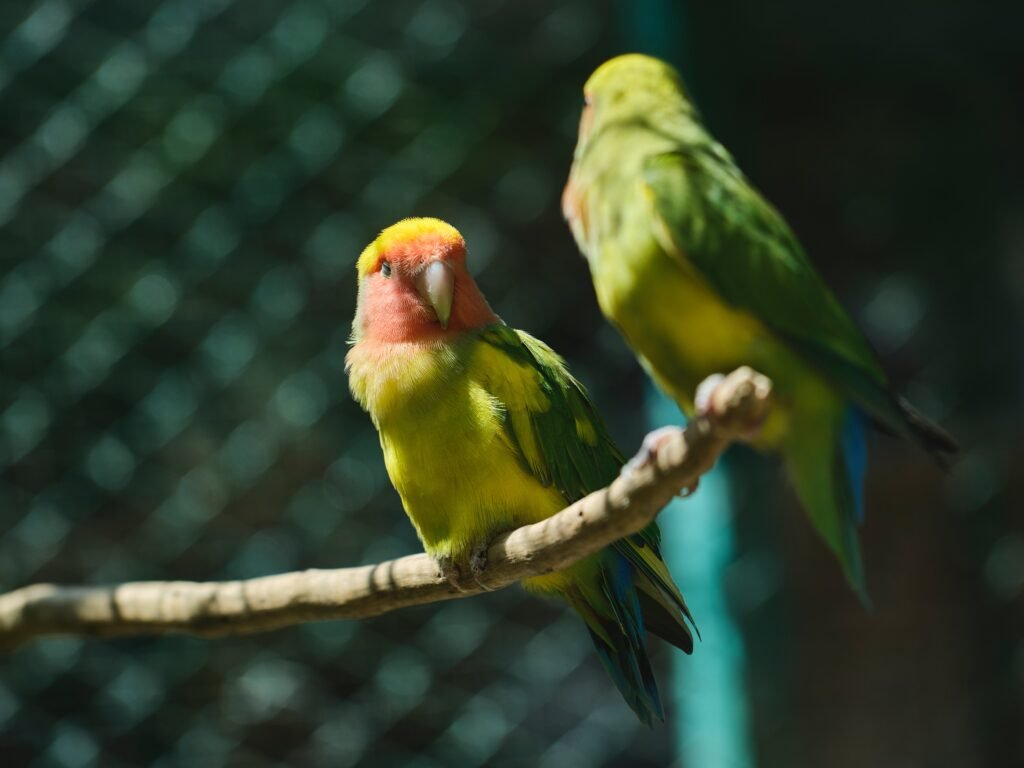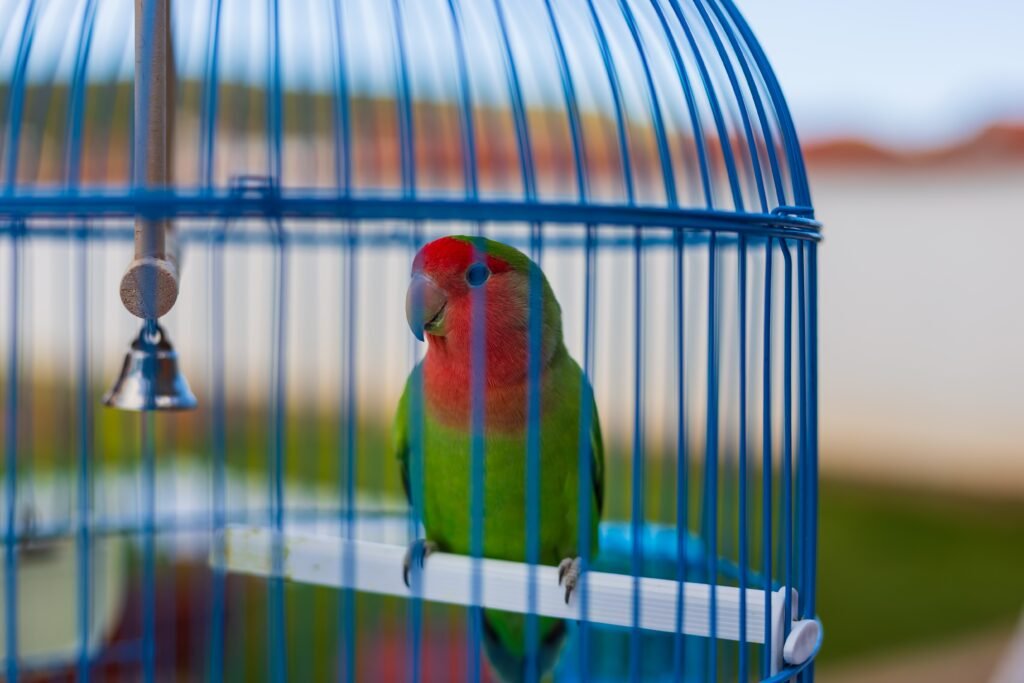Lovebirds are widely known for their charming personalities and vibrant colours, making them popular avian companions among bird enthusiasts around the world. These small parrots, native to Africa, have captured the hearts of many due to their affectionate nature and unique behaviours. Understanding the individuality of lovebirds is crucial for creating a strong bond with your feathered friend and ensuring their overall well-being. This article will explore the various aspects of lovebirds’ personalities and how to nurture a fulfilling relationship with these delightful creatures.
- Introduction to Lovebirds
Lovebirds, scientifically classified as Agapornis, belong to the parrot family and are characterized by their small size, typically ranging from 5 to 7 inches. These friendly birds are known for their monogamous nature and strong attachment to their chosen mate. Lovebirds are available in various species, including the Peach-faced Lovebird, Fischer’s Lovebird, and the Masked Lovebird, each exhibiting unique physical traits and behaviours.
Lovebirds are fascinating creatures with a wide range of behaviours and characteristics. They are highly social birds that thrive on companionship and interaction. By understanding their behaviour, you can provide them the care they need to lead a happy and fulfilling life.
- Understanding Lovebirds’ Behavior
Lovebirds are highly social creatures that thrive on companionship and interaction. They are renowned for their affectionate nature and have been named lovebirds due to their strong bond with their chosen mate. These birds often display their affection through preening, feeding one another, and engaging in mutual grooming rituals.
Apart from their amorous behaviour, lovebirds are also known for their playful and active nature. They enjoy exploring their surroundings, climbing, and hanging upside down from various perches. Providing them with plenty of toys, swings, and interactive objects in their environment can help stimulate their curious minds and prevent boredom.
Lovebirds are curious by nature and enjoy discovering new things. Therefore, it’s essential to provide them with a stimulating environment that includes a variety of toys and activities. This will keep them mentally and physically engaged, prevent boredom, and promote a healthy lifestyle.
Here are some tips for enriching their environment:
- To keep them entertained, provide a variety of toys, such as puzzles, foraging toys, and chew toys.
- Rotate their toys regularly to maintain their interest and prevent them from becoming bored.
- Include swings and perches of different sizes and textures to encourage climbing and exercise.
- Create a safe and secure outdoor play area where they can explore and interact with their surroundings under supervision.
Providing a stimulating environment ensures that your lovebird remains happy, healthy, and mentally stimulated.
- Identifying Lovebirds’ Personalities
Just like humans, lovebirds have distinct personalities that make them unique individuals. Understanding your lovebird’s personality traits can help you tailor their care and create an environment that suits their needs. Here are some common personality traits observed in lovebirds:
- Confident and Outgoing Lovebirds
Some lovebirds are naturally outgoing and confident. They readily approach new experiences, interact with their human companions, and explore their surroundings fearlessly. These birds are often curious and may enjoy learning new tricks or engaging in interactive playtime with their owners.
To cater to the needs of confident and outgoing lovebirds:
- Provide them with plenty of opportunities for social interaction and mental stimulation.
- Encourage their curiosity by introducing new toys and activities regularly.
- Consider setting up an obstacle course or teaching them simple tricks to engage their active minds.
- Shy and Reserved Lovebirds
On the other hand, some lovebirds may be more reserved and cautious by nature. These birds may take longer to warm up to new people or situations and prefer a quieter and calmer environment. Providing a safe space with plenty of hiding spots and a gradual introduction to new experiences can help these lovebirds feel more secure.
To create a comfortable environment for shy and reserved lovebirds, ensure they have a quiet and secluded area in their cage where they can retreat when they feel overwhelmed. Avoid sudden loud noises or excessive handling, as this can cause stress. Instead, they should be offered gentle and patient interactions to build trust over time.
- Playful and Energetic Lovebirds
Lovebirds with a playful and energetic personality are always on the go. They enjoy hopping, climbing, and engaging in various physical activities. These birds benefit from exercise outside their cage, such as supervised flight time or play sessions in a secure and bird-proofed area.
To cater to the needs of playful and energetic lovebirds:
- Provide them with ample opportunities for physical exercise and mental stimulation.
- Set up a play gym or provide a variety of toys that encourage movement and exploration.
- Consider incorporating interactive toys that challenge their problem-solving skills and keep them engaged.
- Cuddly and Affectionate Lovebirds
Certain lovebirds have an innate desire for physical contact and affection. These birds enjoy being held, cuddled, and snuggled by their human companions. Building a strong bond with your lovebird through gentle handling and positive reinforcement can help nurture their affectionate nature.
To foster a strong bond with cuddly and affectionate lovebirds:
- Spend quality time with them, providing gentle physical contact and positive reinforcement.
- Offer a safe, comfortable space for them to perch on your shoulder or snuggle against your chest.
- Engage in soft and soothing interactions to make them feel secure and loved.
- Nurturing a Strong Bond with Your Lovebird
Building a strong bond with your lovebird is essential for their well-being and happiness. Here are some tips to foster a deep and meaningful connection with your avian companion:
- Patience and Trust-building
Developing trust takes time and patience. Start by offering food treats from your hand, gradually allowing your lovebird to approach and take treats at their own pace. Avoid sudden movements or forcing interactions, which can disrupt trust-building.
- Socialization and Interaction
Lovebirds thrive on socialization and interaction. Spend quality time with your feathered friends daily, talking to them, playing games, or engaging in gentle training sessions. This regular interaction strengthens the bond and helps your lovebird feel more comfortable and secure in your presence.
- Providing Enrichment and Stimulation
Lovebirds are intelligent and curious creatures that require mental stimulation. To keep them engaged and entertained, offer a variety of toys, puzzles, and interactive objects. Rotate their toys regularly to prevent boredom and provide new challenges for them to explore.
- Respect Their Personal Space
While lovebirds crave attention and interaction, they also need their personal space. Respect their boundaries and avoid overhandling or overwhelming them with constant attention. Allow them quiet moments, providing a comfortable and secure space within their cage where they can retreat when needed.
By following these tips, you can establish a strong bond with your lovebird and ensure their happiness and well-being.
Conclusion
Understanding the individuality of your lovebird’s personality is crucial for developing a strong and fulfilling relationship with them. By observing their behaviours, respecting their needs, and providing a nurturing environment, you can create a harmonious bond that will bring joy to you and your avian companion. Remember, each lovebird is unique, and taking the time to understand their distinct traits will help you create a loving and enriching life together.
FAQ
Q1: What are some common personality traits observed in lovebirds?
A1: Lovebirds can have confident and outgoing, shy and reserved, playful and energetic, or cuddly and affectionate personalities.
Q2: How can I cater to the needs of confident and outgoing lovebirds?
A2: Provide opportunities for social interaction and mental stimulation, introduce new toys and activities regularly, and consider setting up an obstacle course or teaching them tricks.
Q3: How can I create a comfortable environment for shy and reserved lovebirds?
A3: Ensure they have a quiet and secluded area in their cage, avoid sudden loud noises or excessive handling, and offer gentle and patient interactions to build trust over time.
Q4: How can I cater to the needs of playful and energetic lovebirds?
A4: Provide ample opportunities for physical exercise and mental stimulation, set up a play gym or provide a variety of toys that encourage movement and exploration, and incorporate interactive toys that challenge their problem-solving skills.
.


